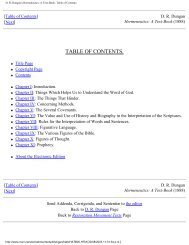Dungan - Hermeneutics
You also want an ePaper? Increase the reach of your titles
YUMPU automatically turns print PDFs into web optimized ePapers that Google loves.
D. R. <strong>Dungan</strong>'s <strong>Hermeneutics</strong>: A Text-Book: Chapter IV.<br />
Prof. Moses Stuart, of Andover, says:<br />
"Nearly all treatises on hermeneutics, since the days of Ernesti, have laid it down as a maxim which<br />
can not be controverted that the Bible is to be interpreted in the same manner, that is, by the same<br />
principles, as all other books. Writers are not wanting, previously to the period in which Ernesti lived, who<br />
have maintained the same thing; but we may also find some who have assailed the position before us, and<br />
labored to show that it is nothing less than a species of profaneness to treat the sacred books as we do the<br />
classic authors with respect to their interpretation. Is this allegation well grounded? Is there any good<br />
reason to object to the principle of interpretation now in question? In order to answer, let us direct our<br />
attention to the nature and source of what are now called principles or laws of interpretation: Whence did<br />
they originate? Are they the artificial production of high-wrought skill, of labored research, of profound<br />
and extensive learning? Did they spring from the subtleties of nice distinctions, from the philosophical and<br />
metaphysical efforts of the schools? Are they the product of exalted and dazzling genius, sparks of<br />
celestial fire, which none but a favored few can emit? No; nothing of all this. The principles of<br />
interpretation as to their substantial and essential elements, are no invention of man, no product of his<br />
effort and learned skill; nay, they can scarcely be said with truth to have been discovered by him. They are<br />
coeval with our nature. Ever since man was created and endowed with the powers of speech, and made a<br />
communicative and social being, he has had occasion to practice upon the principles of interpretation, and<br />
has actually done so. From the first moment that one human being addressed another by the use of<br />
language, down to the present hour, the essential laws of interpretation became, and have continued to be,<br />
a practical matter. The person addressed has always been an interpreter in every instance [51] where he<br />
has heard and understood what was addressed to him. All the human race, therefore, are, and ever have<br />
been, interpreters. It is a law of their rational, intelligent, communicative nature. Just as truly as one<br />
human being was formed so as to address another in language, just so truly that other was formed to<br />
interpret and understand what is said."<br />
(5.) More than any other thought or feelings a want of sound faith, has contributed to a wrong system<br />
of hermeneutics, and even to the abolition of all system. At a very early date, philosophies were<br />
introduced as the equal of the teaching of the apostles. And even up to the time of the Reformation, the<br />
study of Christian philosophers was thought to be more desirable than the study of Paul. And it made<br />
such a lasting impression on the minds of the people that they have not entirely recovered from it yet.<br />
Men studied Augustine, and were regarded sound, or otherwise, as they agreed with that saint. The<br />
schools of theology were not so much to study the Bible as to become acquainted with the views of their<br />
great men.<br />
Blackburne, in his "History of the Church," pp. 226, 227, gives us a good statement respecting the<br />
condition of things in the ninth century:<br />
"A subtle philosophy was brought into the controversies of the West by John Scotus Erigena<br />
(Irishman), the adviser and confidant of the French king, Charles the Bald, who had some of the tastes of<br />
his grandfather, Charlemagne. John was the teacher of the court school. He was the enigma and wonder of<br />
his time. He suddenly comes, and all at once disappears; so that we know not whence he came nor whither<br />
he went. He was undoubtedly the most learned man, and the deepest, boldest and most independent<br />
thinker of his age, in which he was neither understood nor appreciated, and he was scarcely deemed even<br />
worthy of being declared a heretic. The churchmen of Paris rectified the omission in 1209, and burnt some<br />
of his books and pantheistic followers. Though he wished to retain [52] some of the essential doctrines of<br />
Christianity, his system was one great heterodoxy, based upon Plato, Aristotle, Plotinus, and himself.<br />
http://www.mun.ca/rels/restmov/texts/ddungan/hatb/HATB04.HTM (3 of 29) [30/08/2003 11:33:02 p.m.]




